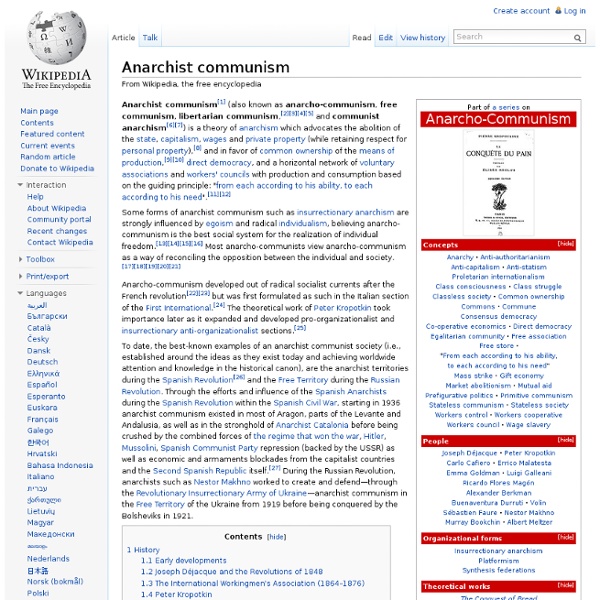Anarchism
The central tendency of anarchism as a social movement has been represented by anarcho-communism and anarcho-syndicalism, with individualist anarchism being primarily a literary phenomenon[25] which nevertheless did have an impact on the bigger currents[26] and individualists have also participated in large anarchist organisations.[27][28] Many anarchists oppose all forms of aggression, supporting self-defense or non-violence (anarcho-pacifism),[29][30] while others have supported the use of some coercive measures, including violent revolution and propaganda of the deed, on the path to an anarchist society.[31] Etymology and terminology[edit] The term anarchism is a compound word composed from the word anarchy and the suffix -ism,[32] themselves derived respectively from the Greek ἀναρχία, i.e. anarchy[33][34][35] (from ἄναρχος, anarchos, meaning "one without rulers";[36] from the privative prefix ἀν- (an-, i.e. "without") + ἀρχός, archos, i.e. History[edit] Origins[edit]
Socialism
Socialism is a range of economic and social systems characterised by social ownership and democratic control of the means of production,[10] as well as the political theories and movements associated with them.[11] Social ownership may refer to forms of public, collective or cooperative ownership, or to citizen ownership of equity.[12] There are many varieties of socialism and there is no single definition encapsulating all of them,[13] though social ownership is the common element shared by its various forms.[5][14][15] Etymology The origin of the term "socialism" may be traced back and attributed to a number of originators, in addition to significant historical shifts in the usage and scope of the word. For Andrew Vincent, "[t]he word ‘socialism’ finds its root in the Latin sociare, which means to combine or to share. The related, more technical term in Roman and then medieval law was societas. History Early socialism Paris Commune First International Second International Early 20th century
The indicators: an overview | Measuring well-being | Learn | National Accounts of Well-being
The National Accounts of Well-being indicators on this website represent a working model of measures which governments can use to monitor the well-being of their citizens. The indicators have been constructed by nef, using data from the 2006-2007 European Social Survey . This is the most comprehensive and detailed international survey of well-being ever undertaken. The resulting survey dataset was used to develop an indicator set around two headline measures of personal well-being and social well-being : the two crucial aspects of how people experience their lives. As the diagram shows, each headline indicator is broken down into component indicators (and in places also subcomponent indicators) which reflect the different aspects which together comprise experienced well-being. The seven main components of personal and social well-being are also the elements used to create national Well-being Profiles (with emotional well-being split into its subcomponents).
Hannah Arendt
Life and career[edit] Arendt was born into a secular family of German Jews in Linden (present-day Hanover), the daughter of Martha (born Cohn) and Paul Arendt.[7] She grew up in Königsberg (renamed Kaliningrad and annexed to the Soviet Union in 1946) and Berlin. At the University of Marburg, she studied philosophy with Martin Heidegger. According to Hans Jonas, her only German-Jewish classmate, Arendt embarked on a long and stormy romantic relationship with Heidegger, for which she later was criticized because of Heidegger's support for the Nazi Party when he was rector at the University of Freiburg. In the wake of one of their breakups, Arendt moved to Heidelberg, where she wrote her dissertation under the existentialist philosopher-psychologist Karl Jaspers on the concept of love in the thought of Saint Augustine. Paris[edit] New York[edit] Post-war[edit] A letter about Palestine signed by Albert Einstein, Hannah Arendt and others Death[edit] Works[edit] The Origins of Totalitarianism[edit]



